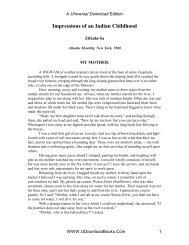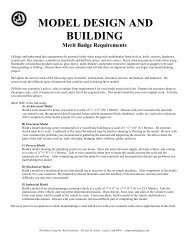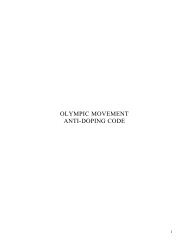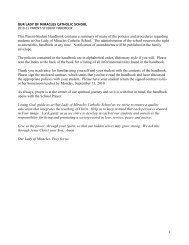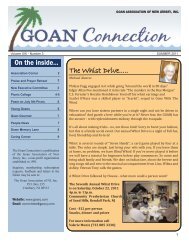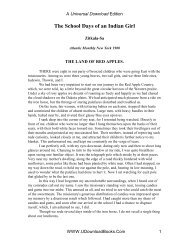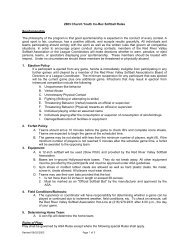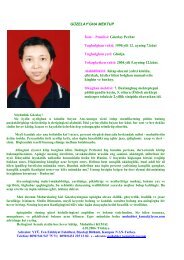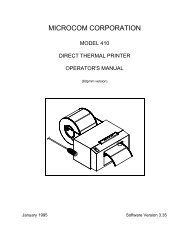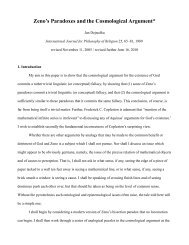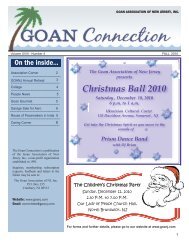Dummett's Backward Road to Frege and to Intuitionism - Tripod
Dummett's Backward Road to Frege and to Intuitionism - Tripod
Dummett's Backward Road to Frege and to Intuitionism - Tripod
Create successful ePaper yourself
Turn your PDF publications into a flip-book with our unique Google optimized e-Paper software.
eversing the metaphysical order of completeness, <strong>and</strong> reversing arguments <strong>and</strong> values as well. Of<br />
course, on an on<strong>to</strong>logically serious mapping reversal, objects <strong>and</strong> functions must be “converted..., or,<br />
speaking more precisely, represented” as appropriate (<strong>Frege</strong> 1970d: 46).<br />
The other two models may seem inappropriate as well. Tones <strong>and</strong> forces are neither wholly<br />
objective nor wholly subjective on my view, <strong>and</strong> they are not ways <strong>to</strong> identify anything. But I shall<br />
argue that the second model is workable, <strong>and</strong> that the third model is best.<br />
Are ideas, <strong>to</strong>nes, <strong>and</strong> forces objects because “the idea my assertion of ‘A’ produces in you,”<br />
“the <strong>to</strong>ne of assertion ‘A’,” <strong>and</strong> “the asser<strong>to</strong>ric force of assertion ‘A’” must always refer <strong>to</strong> objects? The<br />
quick answer is no, since objects are essentially <strong>and</strong> wholly objective.<br />
As we saw, Dummett lists ideas as a sub-category of objects (1981a: 429). That would be a<br />
quick way <strong>to</strong> rescue idealist intuitionism from psychologism (Dummett 1981: 684)! Indeed, it would<br />
rescue psychologism from psychologism. For it makes nonsense of <strong>Frege</strong>’s twelve private language<br />
arguments (my 2003: 289 n.1) <strong>and</strong> his cautious verdict that ideas can at best be “taken as” objects<br />
(1970f: 60; see 1968a: 510). The verdict implies that ideas are not objects. Why would <strong>Frege</strong> suggest<br />
that ideas can be “taken as” objects, if Dummett is right that ideas already are objects? On Dummett’s<br />
account, should not <strong>Frege</strong> be suggesting that ideas—or private objects—can be taken as public objects?<br />
But <strong>Frege</strong> speaks of objects without qualification. The verdict also implies that the arguments aim <strong>to</strong><br />
show not just that our thoughts are objective, but that the things we talk about, i.e., our references, are<br />
objective. This double aim merges in indirect reference. Even in Grundlagen, ideas are not objects.<br />
<strong>Frege</strong> makes ideas subjective Vorstellungen <strong>and</strong> objects objective Vorstellungen; these are mutually<br />
exclusive categories (§ 27, n.1), pace Dummett (1991: 225). Why would <strong>Frege</strong> place ideas <strong>and</strong> objects<br />
in mutually exclusive categories, if Dummett is right that ideas are objects? <strong>Frege</strong> is saying that objects<br />
are objective <strong>and</strong> ideas are subjective. Splitting these objective Vorstellungen (Inhalten) in<strong>to</strong> senses <strong>and</strong><br />
references, the later <strong>Frege</strong>’s objects are just as <strong>to</strong>tally excluded from being ideas. The later <strong>Frege</strong> says<br />
57




